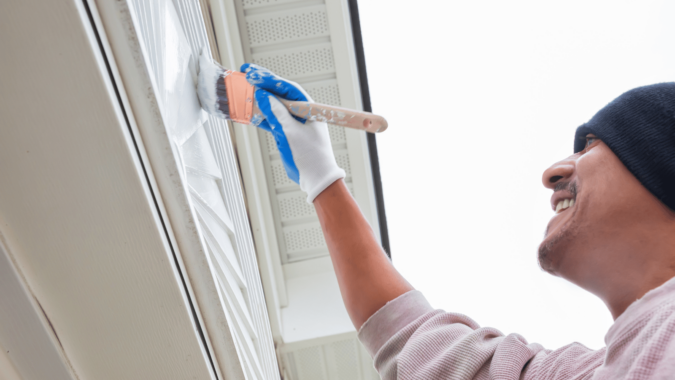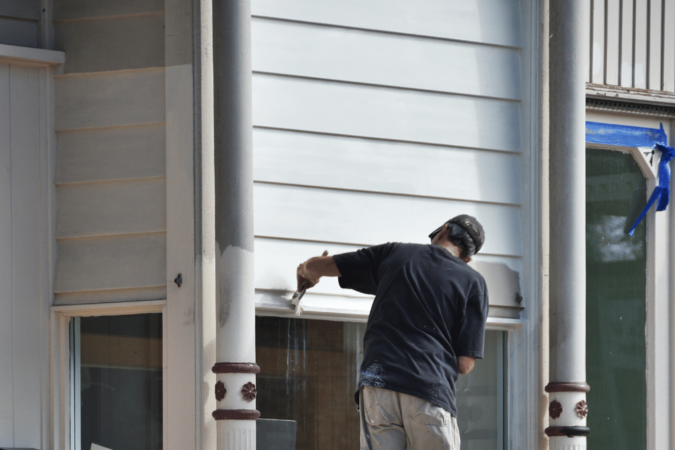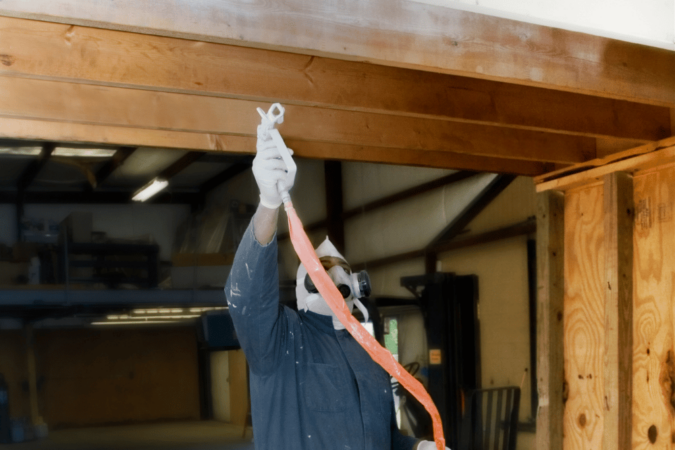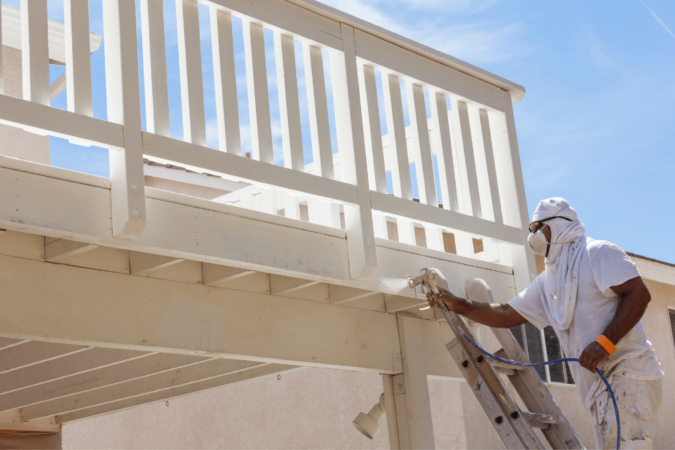
25 Tips To Win Commercial Painting Jobs in 2023

The painting business has become increasingly competitive as more and more contractors enter this line of work. With the emergence of new technologies, business practices, and customer demands, it is essential to stay ahead to land those lucrative painting jobs. To succeed, you’ll need reliable tools to effectively bid on commercial paint jobs in the most cost-effective manner possible. This blog post will guide you on bidding for a paint job and provide 25 tips to help you win commercial paint jobs in 2023. We’ll address everything from selecting quality materials for an appointment to calculating accurate costs for bids. So let’s get started!
1. Develop A Comprehensive Bid Strategy

Creating a bid strategy is one of the most critical steps in any painting project. A good bid strategy should consider all the factors that may affect painting costs and accurately reflect the job you are bidding on. Before bidding, it’s essential to thoroughly research painting costs and estimate how long the job will take. If you’re unsure, it’s always best to consult a painting pro who can help provide accurate estimates and advice. Additionally, be sure to itemize all labor costs. So there are no surprises when you are awarded the painting project. By taking some extra time for preparation, you can ensure that your bids will be competitive and successful in getting your desired painting job.
2. Gather Necessary Documents for the Bidding Process
Collecting all the necessary documents beforehand is essential when bidding on a paint job. For residential jobs, you’ll typically want to ensure how many coats of paint are required and how many gallons might need to be bought. You’ll want to check on how many coats and gallons are required for commercial painting jobs. You must also consider how traffic affects the job. Ensure that both time and labor costs are adequately represented in the bid and any special equipment or preparation needs before starting. Gathering these materials upfront can save time and costly re-dos down the road.
3. Calculate the Paint and Materials Required
When bidding on a paint job, one of the essential parts to calculate is how much paint and materials will be needed. This is especially true with a commercial painting job, as it usually involves much more space than residential projects. To get a proper estimate, you should take into account factors such as:
- How many coats of paint will be needed
- How much primer and sealer might be required for drywall and wood elements
- How many gallons of color will be required for the job
- How many brushes and rollers you’ll need
Make sure your estimates are realistic. It’s always better to overestimate since running out of paint in the middle of the job can cause problems or delays. However, once you accurately estimate how many supplies will be required for your specific project, you can successfully move on to the other steps of bidding on a paint job.
4. Research Commercial Painting Companies in Your Area
Researching painting companies in your area can be invaluable when bidding out a paint job. Often, painting contractors have their bid forms with guidelines and information. It helps you understand what is involved when taking on such a project. In addition, many painting websites may offer helpful resources and suggestions to ensure you have all the materials and costs accounted for before submitting your painting bid.
Checking out customer reviews can also give you an idea of the quality of work from a painting company around you, especially for exterior paint jobs. Finally, doing homework can ensure everything goes smoothly once the painting starts. It helps to check out painting bids from a local painting company in advance for cost comparisons.
5. Make Sure You Have the Right Licenses and Insurance
Before you can bid on commercial painting jobs, it is essential to make sure you have all the proper licenses and insurance in order. This is especially true for a commercial property, which must be carefully inspected before starting your painting project. Without insurance and licensing, a commercial painting project may not be allowed to proceed according to specific regulations or state laws. Ensure you are fully covered by insurance before bidding on a commercial job. This will guarantee that everyone involved with the commercial property is kept safe during the project’s duration.
6. Estimate Labor Costs and Include them in Your Bid
For how to bid on a paint job, one of the most important steps is to include an estimate of labor cost in the total cost of the job. To do this accurately, you’ll need to calculate how long you and your crew will take to complete the project, considering the type of paint needed. Take everything into consideration:
- How many walls need to be painted, and how high are they
- How much furniture must be moved
- How many doors need to be removed, repainted, and reinstalled
Once all these labor hours have been accounted for, add your material and labor costs together, as this will give you an accurate estimate when bidding on a paint job.
7. Have the Right Equipment on Hand
Having the right equipment is vital when bidding for a commercial paint job. Not only does this ensure that you’ll be able to complete the project quicker and more efficiently. It also reflects positively on your painting business. Having the wrong equipment can not only lead to an increase in the cost of labor. There’s also a risk of inferior quality and an unhappy customer. To ensure your commercial paint job is successful, always have the right tools and materials available before you begin working. This will put you in a great position to bid competitively while guaranteeing high-quality results.
8. Consider Environmental Regulations for Materials and Emissions
When bidding on a paint job, it’s essential to consider environmental regulations for emissions and specialty materials. Different paints require specialty materials that the local government may determine and can increase your bid amount due to their higher cost. Common materials typically used for commercial painting jobs, such as water-based paints, are much more conducive to the environment since they dry faster and create little VOCs. Depending on the size of the paint job you’re bidding on, understanding these environmental regulations could mean the difference between winning a project or not.
9. Account for Project Management Time
If you’re a professional painter and bid on paint jobs, it’s important to remember that project management time is a crucial aspect to consider when determining your bid. Painting contractors will account for one day of onsite management every week spent on the job. To succeed, you should also factor in travel time to and from the job and any meetings or research you may need to complete off-site. Keep this all in mind before submitting a bid so you can present a competitive offer that paints you as a confident and knowledgeable professional.
10. Identify Specialized Skills Needed

When preparing to bid on a paint job, a good starting point is to identify the specialized skills needed. Not all projects require the same skill and expertise. So doing your research accordingly is essential. For exterior painting, for instance, you’ll need to measure the wall space and compute square footage. If you’re doing interior painting, it will involve different factors, such as prepping wall surfaces by sanding them or applying a primer coat before painting. It’s essential to figure out what kind of surface preparation needs to be done before artwork to give an accurate bid proposal.
11. Know Your Competition
Knowing your competition is essential when bidding on a painting job. Research material costs and determine what other contractors charge for material costs in the painting industry. Speak to local material suppliers about their prices and calculate the total material cost for the job to determine if you need to adjust your bid accordingly. Factor in the project’s square footage as larger jobs requires more preparation before the painting begins. Doing your research will go a long way to helping you price accurately and ultimately get the paint job for you!
12. Communicate With The Client
When bidding on commercial painting jobs, communication with the client is essential. You should discuss material and labor costs that fit the needs of their commercial property. You should also tell them about any additional services or add-ons that your painting job might involve so they can make an informed decision when choosing a painter for their commercial building. Also, explain why hiring a professional commercial painting company is necessary instead of trying to do it themselves. Communication is critical in commercial painting jobs, as it will help you understand your client’s needs and expectations to provide the best services available.
13. Use Technology to Streamline Your Bidding Process
Consider using technology if you’re looking for an efficient way to bid on a paint job. Having square footage and paint cost inputted into a program designed for leading bids can help speed up your process significantly! You also should consider how many gallons of paint you think the job will need and what types of surfaces it will have to cover. The time saved by entering this information into a program that can quickly calculate the estimated cost could save you tons of time and resources. This technology can quickly compare prices between different brands of paint and other supplies so that you get the best deal. One great tip for winning bids on a paint job is streamlining your bidding process with technology.
14. Address Any Questions Promptly
When bidding on paint jobs, it’s essential to address any queries or questions your customer may have promptly. Paint prices can sometimes vary significantly. So ensure you are aware of how much a gallon of paint covers and the prices of the materials you’ll need before submitting your bid. Doing thorough research will help ensure each bid reflects fair market rates and gives you an advantage over any competition while maintaining competitive pricing. Be mindful that a delay in getting back to prospective customers with questions can cause them to look elsewhere when deciding who to hire for their paint job needs.
15. Pay Attention to Detail
When painting bids, one of the most important steps is to pay attention to detail. You must remember to accurately calculate painting materials and labor for each area of the painting job. This means determining the total square footage and accounting for factors such as high ceilings or floor space, stairs, and odd shapes. Including any marketing costs associated with painting supplies also helps ensure accurate estimates using realistic figures rather than making assumptions. Keeping a close eye on all painting details can give you a competitive edge when submitting painting bids. It ultimately determines the success of your painting business.
16. Outline Your Terms and Conditions
When competing for a painting job, a painting contractor should outline their terms and conditions clearly and concisely. This should include painting rates based on the project’s square footage and a minimum target profit margin that must be met before the painting contractor accepts a job. By outlining these criteria before bidding, painting contractors can weigh the pros and cons amid competitive bids and decide if they wish to engage in the painting project. Additionally, establishing these criteria allows prospective clients to understand what is expected from both parties throughout the painting process.
17. Stay on Schedule
As a painting business owner, staying on schedule is essential when winning painting jobs. Clients who know you can deliver the painting job on time will likely hire you. Keeping up with your painting commitments and timing the painting of their properties accordingly will increase the likelihood of them giving you the painting job. As a painting business owner, make sure that you prioritize staying on schedule and that you adhere to any deadlines set by your clients’ expectations. Staying ahead of pre-set deadlines will make your painting business more reliable and trustworthy in their eyes.
18. Factor in Health and Safety Requirements

When bidding on commercial painting projects, it is important to consider health and safety requirements. Even though you may offer the most competitive price for a commercial paint job, you will still need to account for any additional protective equipment or procedures implemented to ensure your team’s safety and well-being. This can include respirators, goggles, dust masks, scaffolding, or first aid kits – all of which add a certain magnitude of the cost, which must be considered if commercial painting projects are going to be undertaken properly. Failing to factor these considerations into the overall cost of a commercial paint job could be financially costly regarding task completeness.
19. Provide Accurate Estimates for Time and Materials
When providing accurate estimates for time and materials, remember the cost of supplies, labor cost, square footage to be painted, and the overall project timeline. Painting estimates are essential for clients and painting contractors as it helps determine a final estimate that benefits both parties. Estimates should be provided by accurately measuring the area(s) to be painted, pricing out the supplies and materials needed, and associated labor and project timelines. Accurately providing accurate estimates ensures everyone benefits while better understanding costs. So, it’s easier to schedule crews and deadlines.
20. Offer Value-Added Services
Offering value-added services to commercial painting jobs can be a successful strategy for winning those bids. When submitting bid proposals, stay focused on supplying detailed quotes that include specific paint job details, such as the home’s roof line. When bidding for commercial painting jobs, it pays to offer value-added services. It is a great way to stand out from the competition and show potential clients you can meet their specific needs.
For example, if a commercial paint job requires you to access a roof line or an otherwise hard-to-reach space, let potential clients know you can work with contractors and specialists if necessary to get the job done. Include the cost of these extra services in your bid so the client can plan the entire exterior job. Doing so should give you an edge on any commercial project.
21. Have a Comprehensive Post-Job Cleanup Plan
To win a paint job, you must show potential clients your comprehensive post-job cleanup plan. You must be prepared to remove paint from floors, carpets, and upholstery. As paint splatters no matter how careful you are, having the tools on hand for any hard spots can make all the difference in delivering outstanding customer results. Not only should you take care of paint spills and question marks on the wall. You should also respect a client’s space by vacuuming and cleaning everything related to the paint job before it is finished. This will ensure that a client’s property is left in pristine condition after you have completed their paint job.
22. Showcase Examples of Past Work
When it comes to winning a commercial painting job, showcasing examples of past paint jobs you have completed is key. Demonstrating the quality and style of your work will show potential clients what your capabilities are and set you apart from other paint professionals. When presenting your portfolio, be prepared to discuss the paint job and provide a complete look at what was done. Clients need to know that they can trust your techniques and materials to deliver outstanding paint jobs consistently. Presenting examples of past paint jobs will help strengthen this trust, leading to more wins in commercial painting bids.
23. Demonstrate Quality of Workmanship in Your Proposal
When submitting a proposal for a paint job, it is essential to show your quality of workmanship by having a portfolio of previous painting jobs and providing detailed descriptions of the results. Include certificates and licenses you have obtained and any safety-certified processes you may be implementing. Be sure to provide evidence of good practices by citing customer reviews or testimonies that can give potential customers peace of mind when selecting you for the paint job. Last, always maintain professionalism in your proposal. Being organized and responding swiftly to inquiries can make all the difference in winning a paint job.
24. Highlight any Unique Features or Benefits of Your Company

When winning a commercial painting job, highlighting your company’s unique features or benefits is key to success. For example, vegetation coverage, experienced crews, and business insurance are all attributes within a professional commercial painting business that clients will likely look for. Ensuring prospective customers know these features in advance can help you win the job, as they’ll be confident that their project is in good hands when you begin work. Clients will appreciate this reliability. So ensure they know it before hiring you.
25. Follow Up After Submission to Show Commitment to the Job
Following up after submitting your portfolio or bid for a commercial painting job is a meaningful way to show commitment and enthusiasm for the opportunity. By showing this level of interest, you demonstrate your dedication and provide tangible evidence that you are invested in getting the job. Following up also provides an excellent opportunity to present additional info about yourself that couldn’t fit the initial application material, giving you a higher chance of standing out from other potential candidates. Taking the time to reach out on your initiative with genuine thoughts will leave a lasting impression on employers and may set you apart.
Wrapping Up
Bidding on a paint job can be daunting. With these 25 tips, you’ll be well on your way to winning commercial painting jobs in 2023. Remember to factor in the cost of materials, the time it will take to complete the job, and the frequency of repainting when preparing your bid. With some research and planning, you can submit a competitive bid that will win you the job. If you’re interested in learning more about how to run your business, be sure to check out our other blogs.





